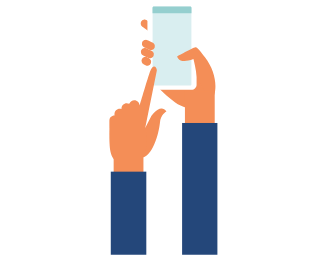Accepting help
Asking for or accepting help from other people often doesn’t come naturally and might even (wrongly) feel like a sign of weakness, but it is important to have a support network to help you along your journey to recovery.
Letting others help you to tackle and eventually overcome an eating disorder is the first step you will take on the path to recovery. Seeking help from medical professionals is very important, but so too is having a network of support from those around you.
- Are you the kind of person who works hard to appear strong and independent, and feels that asking for help is being vulnerable or weak?
- Do you struggle to accept help because you don’t think you deserve it, or you feel guilty and worried about imposing on others?
- Do you resist help that is offered because you don’t really believe you need it?
If any of these sound familiar, you are not alone. Asking for help takes great courage but having someone to remind you of your good qualities; someone who likes you and loves you despite your eating problems and who reminds you that you can get through this, is invaluable.
Asking for help – who could you call on?
Think about the people in your life at the moment who might be able to help you and give you space to talk; perhaps people who are older than you such as relatives, teachers, colleagues etc. Or they might be people more ‘on your level’ – people you would spend time with and whose company you enjoy. You might think that right now you couldn’t ask some of them for support but include them on your list and try to avoid ruling them out before you have even written them down!
Next, look over your list and choose a few people who you know you can really rely on. Can you do anything to help them to support you? Maybe you need to tell them what’s going on and admit that you have a problem you are struggling to overcome? Could you write them an email, or arrange to meet for a coffee? You might want to arrange a regular get-together with a trusted person so that you know when you’ll have that space to talk things through. Remember, you’re not looking for amateur therapists, but a network of people who care about you – some of them may provide more than others in the way of advice, however the main thing is connecting with them and sharing something of yourself and your journey.
Finding peer support from people with experience of eating disorders
If you don’t yet feel able to open up to someone close to you, talk to us. Our peer support team either have personal experience of recovery or have supported a loved one through recovery. You can book a 1:1 support call, to speak to someone who understands what you’re going through and will listen with empathy providing emotional support and practical guidance. We also have online peer support groups, providing a safe, moderated space for you to connect with others living with or supporting someone with an eating disorder. Sometimes it can feel easier to talk to people that are separate to your day-to-day life, and we are here to help.
Accepting help
Think about your beliefs about receiving
Allow yourself to be vulnerable
Give others an opportunity to help
Pay it forward
“I find it hard to rely on other people. I try not to bother other people and mostly I keep myself to myself. I support lots of other people and I don’t want them thinking that they need to be looking after me. But treatment has helped me to realise that my eating disorder developed because it was too much to cope on my own all the time. I know I am going to have to get over this and let people help me – one step at a time.”
Building a support network
In this blog post, a mother shares how building a support network helped her to support her daughter through eating disorder recovery.
Are you worried that you, or a loved one may have an eating disorder? Our Peer Support Team have lived experiences of eating disorders and recovery.
To talk to someone who understands, book a 1:1 support call, we’re here to help.
